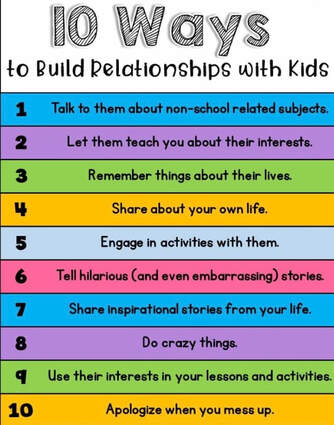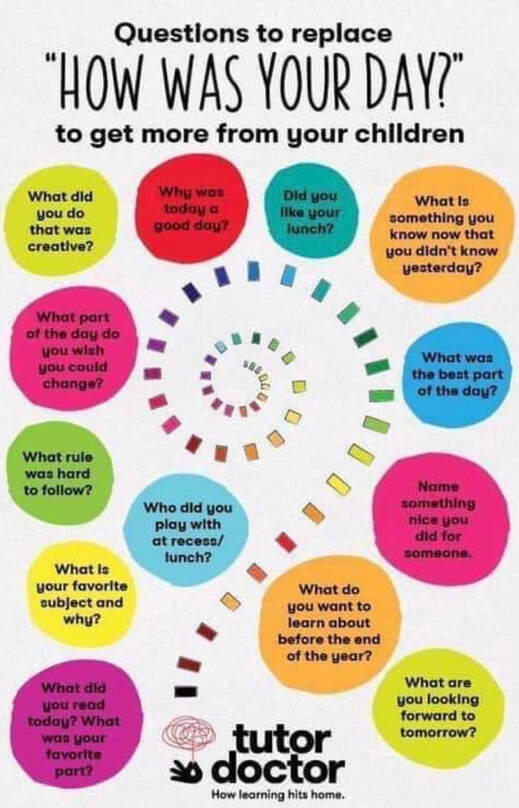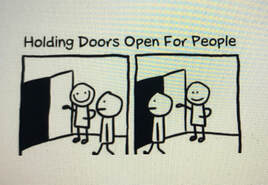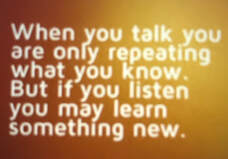Below are some reminders for you to review. I will post some reminders from time to time. Source...The Internet
|
Please take care of yourself and your family during this challenging times with Covid-19. Follow the guidelines of our health professionals as they work to keep us safe.
Below are some reminders for you to review. I will post some reminders from time to time. Source...The Internet  It’s that time of year when most people are thinking about the holidays season, and especially gift giving. I have learned over the years that the stress of trying to shop and please everyone is not worth it. To help you stay more peaceful and stress free, try to remember that everyone who knows you well, already know who you are and what you are about. They know you love them, so don’t think that a Christmas present is going to be the determining factor of that love. No matter what you see on television, keep your focus and remember…
Resource to explore: https://www.wikihow.com/Celebrate-Christmas, https://centsai.com/life/holidays/holidays-blogs/how-to-celebrate-christmas-without-gifts/  If you want to be a good parent, aunt, uncle, friend, to a child, it’s important to work on having a relationship built on honesty and trust with him/her. Having a closer connection to a child not only helps that child to be happy and healthy, but it helps the family to live a more stress free life. When you the adult, engage in building a great relationship with your child, not only do you create an environment that is more peaceful and stress free, you create a person who is disciplined and able to make good decisions as they grow. Grooming a child takes a lot of time and effort, but the pay off in the end can far outweigh the time spent engaging with your child. To help you begin the journey of being a fully “present” adult in a child/s life, here are some ideas you can try. Remember learning new skills takes time. Don’t rush the process. Take you time and break task in manageable pieces. If you can’t get to number ten, choose one thing to do and do it until it becomes a consistent part of your daily life. Sources to explore…https://www.ahaparenting.com/parenting-tools/connection/building-relationship https://www.huffpost.com/entry/how-to-build-a-positive-relationship-with-your-child_b_6174996  It’s important that you engage your kids in some conversation at some point throughout the day. One of the times to do so (not always the favorite for kids) is when you see them after school. It’s a good time to “catch up” and share what each person did throughout the day. Most of us usually stick with the old tried and true, “How was your day”’. Nothing wrong with that as a starter sentence, but here is a list of questions parents can ask to replace the most common question we usually ask, “How was your day?” Choose one of the suggested questions from the chart above. Use its a “frame” to question your child for a week. As you do so, think about the kinds of responses you are getting form your child and compare them to that of those given for the other responses you usually get. Do you observe a difference in their responses and/or thinking? If yo like what you are hearing, continue to use these sentence frames throughout the year. Create your own questions to add to the list. Let me know how you are doing at www.bluemountaiinrhythms.com. #CriticalThinking Source for chart: The Internet/Twitter  It’s Back-To-School season once again and the excitement of a new beginning is still fresh for most kids and parents. Let’s be clear, there will be a few kids who will dread the thought of going back to school and a few parents who will be traumatized by the thought of their child having new experiences they have no control over. Based on my experience in the educational system, one thing I know for sure, is that parents need to be, and must be involved in their children’s school life. As your child goes through the door each morning for school, you as a parent cannot just be content to say goodby, have a nice day, and retire to “your world.” It is a general consensus that if parents are involved in every aspect of their child’s school life, the child will be a more responsible student/person. Parental involvement send signals to a child that makes parent expectations clear. When a parent is not actively engaged in what a child is doing at school, the message sent to the child is one which says, I don’t care, or you are on your own Children need parents to be involved in their school life and here are a few reasons why…
The number of parents involved in their child’s school life must increase. Participating must increase in the way they interact with your child about school, and in the school system itself. It cannot be left to the School District, the principal, or the teachers to take care of everything your child will need. If your child is to rise to the level you desire, you must be an engaged parent. #Let'sGo! INVOLVEMENT ENGAGEMENT ACADEMIC SUCCESS Some source to explore...https://www.mannersmentor.com/the-five-manners-for-opening-every-door/, http://neatoday.org/2014/11/18/the-enduring-importance-of-parental-involvement-2/ http://neatoday.org/2014/11/18/the-enduring-importance-of-parental-involvement-2/, https://www.educationworld.com/a_special/parent_involvement.shtm  Often as is enter a building the person ahead of me is totally oblivious to the idea of holding the door open for me. I learned this social skill as a little girl. I don’t quite remember who taught it to me, but it was a regular practice in my surroundings. Fast forward to me being an adult, and I am often left a little surprised and annoyed that other adults don’t think about this act! Personally, I think it’s an important social skill everyone needs to have in their repertoire. When should we hold a door open? An example is …
What are the benefits for doing this?…
If you want to be considered a “nice” person, try teaching and practicing this unwritten social code. You are in control and will feel better for it. A source to explore...https://www.mannersmentor.com/the-five-manners-for-opening-every-door/  It is not as difficult to be honest as some would want you to believe. Honesty may require one main characteristic, that of being courageous. Being courageous is required at times when you have to deliver a message to someone (maybe someone you really care about), that is factual, requiring you to be straightforward, and sincere in your delivery. The thought of being deceptive, does not enter into your mind especially if you are concerned about honor, and having a high standard of regard for yourself and others. “Calling a spade a spade,” “biting the bullet” are two idioms that comes to mind. Why should we be gracefully honest? Among other things, …
It’s good to note here the the person who practices being dishonest will reap the opposite benefits of being honest. Dishonest people can tell you that most often, they live a life of misery. They are always worried about their daily interactions, not sure about how their day will go from second to second. They spend more time trying to figure out ways to cover up one deception after another. Who really wants to live in this state? Being gracefully honest, allows one to be engaged in more pleasant exchanges with others, which will eventually lead to more fulfilling relationships. Who wouldn’t want that? Go out and get your feelings of tranquility on! #BEGRACEFULLYHONES Source;https://www.psychologytoday.com/us/blog/happiness-in-world/201402/why-be-honest  Ok, so some us have a problem here. How do we talk less but say more. The answer may lie in us being better listeners. It’s a skill that most of us will have to practice daily, because at the base of the implementation lies the difficulty of allowing oneself to be quiet. No one wants to be quiet when they have something to say, and want to express it immediately to anyone who will listen! Our focus is often not to be quiet and be a good listener when someone is speaking. Our goal is to let the audience know that we have something to say, and it cannot wait. Regardless of our eagerness to talk, it is just as important to listen. Listening, to talk less, and at the same time say more, requires one to choose what needs to be communicated wisely. We must be clear, and purposeful. Here are some things to consider as we move towards being better talkers and listeners. Why we should talk less:
Remember that your goal is to talk less and listen more, so be wise about your choices. Source…https://www.lifehack.org/articles/communication/6-benefits-speaking-less-and-listening-more.html  Are names important? Is it ok not to refer to people by their given names? In my career, I have met many student who changed their given name once migrating to the US because there were some who could not pronounce or spell it. What? I admit I was challenged by some names, but rather that say, I’ll call you by ‘new” name, out of respect for the person (children or adults) I always promised to try hard to learn the pronunciation and spelling. I found the lack of respect for someone’s name quite disturbing and wondered why it wasn’t important for others to call people by their given name. It is for me extremely important. A name is an identity marker! It is given to you by parents who had something special in mind when they chose the name. Some parents may have chosen a name because it honors someone, because it refers to something special, because it is unique, or because it carries some expectation. Author Rachel Miller, suggests that “many parents believes that a name holds the power to shape a child's self-esteem and his identity—and influence how he's seen and treated by others.” It is a permanent decision that most parents take seriously. Most of the children I met, and whose names had been changed disliked it. The older ones especially, thought they had lost apart of themselves. So what can we do? First, we might need to think about the implications of not using/calling people by their given names. Take a look at what is suggested by Mike Garry (2015)… “The Importance of Names and Calling People by Names.” CYS. Source…http://cultureandyouth.org/identity/articles-identity/the-importance-of-names/. Secondly, look at the questions for reflection and discussion below to help guide your thinking. Questions for Reflection and Discussion
Think about whether or not you are willingly to undermine a person’s dignity when we refuse to make an effort to refer to them by their given name. Which path will you choose? Source…https://www.parenting.com/article/how-important-is-a-name  Why is most often, rather easy to respond to negativity? Without giving our responses much thought, we are often primed and ready to give a very sharp, negative response to something said that we don’t like hearing. It can be face to face, or on social media where we often give or receive an immediate negative response to a thought/view we may not like. Of course I am guilt of that as well and I have noticed that responding to negativity can make the situation worse. What I am learning to do now though, is to think about how I could respond in a more positive way that will still be effective. It take practice, but it can be done. I am practicing not to respond to every negative view I might hear, read, or is the recipient of. If I am to understand the issue at hand, then I must learn how to be less reactive. So how do I try to handle this or what might you do to not respond to negativity? If you are wanting to be more effective in your communication, then as often as possible…
Acting in a rude manner is very easy to do for most of us. You don’t have to think about being polite, it’s a “free for all!” Anything can happen, and anything goes. It’s more difficult for us to exercise some control about what we say or do. If your goal is to keep your “good” reputation intact, then practice being kind and watch how you respond to negativity or negative people. Remember when communication gets confrontational and emotions are heightened, this is the time you need to take a breath and think before you speak. Let’s try…breath and carry on with your positive and happy self! https://www.psychologytoday.com/us/blog/how-we-work/201210/how-respond-negativity https://hbr.org/2012/09/how-to-respond-to-negativity.html |
Author:
|